人教版英语必修五UNIT1导学案
- 格式:doc
- 大小:137.00 KB
- 文档页数:10
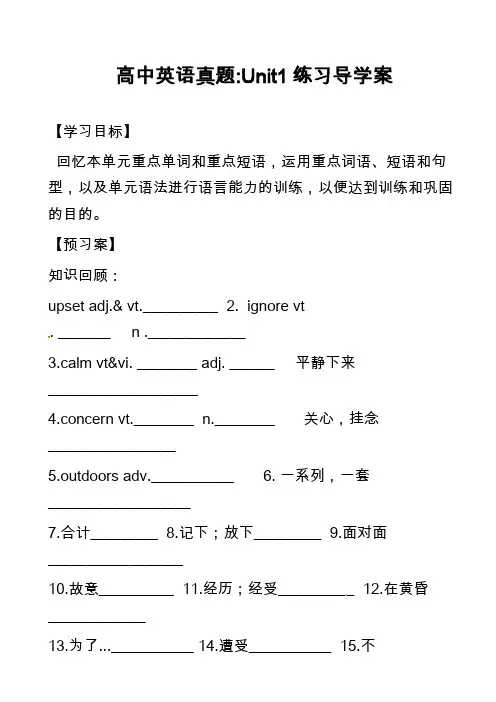
高中英语真题:Unit1练习导学案【学习目标】回忆本单元重点单词和重点短语,运用重点词语、短语和句型,以及单元语法进行语言能力的训练,以便达到训练和巩固的目的。
【预习案】知识回顾:upset adj.& vt.__________ 2. ignore vt. _______ n ._____________3.calm vt&vi. ________ adj. ______ 平静下来____________________4.concern vt.________ n.________ 关心,挂念_________________5.outdoors adv.___________6. 一系列,一套___________________7.合计_________ 8.记下;放下_________ 9.面对面__________________10.故意__________ 11.经历;经受__________ 12.在黄昏_____________13.为了...___________ 14.遭受___________ 15.不再..._________________16.吸引人;入迷____ ______ 17.处于...的控制之中___________________【活动练习1】1. There was time novels written by Taiwan wri ter Qiong Yao were very popular in China.A. a; thatB. \; whenC. a; whenD. \; that2. — I think true friendship is worth more than money.— Great minds think alike!A. Me too.B. No problem.C. All right.D. Good idea.3. — The overcoat is too expensive. Can you sell it cheaper?— Sorry, it’s beyond my .A. concernB. powerC. itemD. tip4. It is very cold outside; you’d better wear a thick warm coat,you’ll make yourself ill.A. orB. forC. butD. and5. Though school life is important, we can’t the fact th at children spend more time at home than in the classroom.A. ignoreB. recoverC. experienceD. settle6. It’s because they have a lot in common they are ge tting along well with each other.A. whyB. howC. thatD. who7. — Who called you up just now?— Mary. She asked my homework.A. if had I finishedB. if I had finishedC. I had finishedD. had I finished8. It was the first time in my life that I the Great Wall. You can’t imagine how excited I felt!A. had visitedB. visitedC. visitD. have vi sited9. — What did our teacher say?— She told us a friend in need a friend indeed.A. isB. has beenC. will beD. had been10. Mrs. Chen devotes herself to teaching. We love and respect her very much.A. nearlyB. entirelyC. certainlyD. exactly11. — My watch doesn’t work; I’ll get it .— Why not buy a new one. It’s too old.A. to repairB. repairingC. repairD. repaired12. — Why don’t you go to the museum with us?— Because I’ve got homework to do and there arevisitors there on Sundays.A. too much; too manyB. too many; too muchC. too much; too muchD. too many; too many13. is no pleasure watching TV at home every day. Let ’s go out for a picnic, OK?A. ThereB. ItC. WhatD. That14. The teacher advised Tom to what he saw and wha t he thought during his trip.A. add upB. hide awayC. go throughD. set down15. While through the old photos, I thought of many ha ppy days.A. lookedB. lookC. lookingD. to look16. Mary has been abroad for 6 months. I have writtento her but I haven’t had time.A. mustB. couldC. shouldD. might17. finish the difficult task on time, we had to work day and night for weeks.A. So as toB. So thatC. In order thatD. In order to18. — Do you need help in your luggage?— No, thanks. I can manage it by myself.A. carryB. carryingC. to carryD. carried19. As we all know, many laws of nature actually existed before they .A. were discoveredB. discoveredC. discoversD. is discovered20. — Would you mind if I used your English dictionary?— Here you are.A. You’re right.B. No way.C. I’m afraid not.D. Of course not.【活动练习2】第二节完形填空(共20小题;每小题1 分,满分20分)It was a Christmas break from school almost 40 years ago. I had spent most of the morning like any boy would, 21 outsi de in the snow and enjoying the sunlight on the 22 day of the year. I liked stepping through the snow, making snowball s to 23 the trees, and watching the smoky breath float (飘) out of my 24 . After a while, though, the 25 got to be too much and I w ent 26 .It was warm in the house. I 27 my wet coat and put on m y favorite blue sweater. Then I walked into the 28 . My mo m and grandma had just 29 baking two loaves of Italian b read. Mom looked up, smiled at me and asked me what I wan ted for 30 . I smiled back and pointed to the delicious brea d. Mom laughed, 31 a slice off the bread, and buttered it f or me. Then she told me to go sit 32 the stove (炉子) in the living room. Taking my slice with me I sat in my favo rite chair, and felt the gentle heat (热) from the stove 33my little body. It was a moment of pure 34 . I felt so good and so loved that I 35 it to this day.Our daily 36 and love are all we need in this life. They are all we need to 37 . Anything else is just an extra blessing to be used to make this world a 38 place for us all.Be thankful for the daily bread that fills your 39 and for da ily love that fills your soul. Then go out and with great joy 40your bread, your blessings, and your love with the world.21. A. talking B. playing C. driving D. singing22. A. hottest B. quickest C. biggest D. shortest23. A. pick up B. look for C. throw at D. care about24. A. mouth B. pool C. box D. room25. A. illness B. cold C. waste D. smoke26. A. inside B. away C. fast D. alone27. A. put aside B. took off C. gave awayD. found out28. A. classroom B. station C. office D. kitchen29. A. suggested B. allowed C. finished D. begun30. A. rest B. support C. pleasure D. lunch31. A. beat B. pulled C. cut D. ate32. A. by B. around C. under D. with33. A. touch B. warm C. help D. protect34. A. peace B. friendship C. freedom D. luck35. A. write B. respect C. follow D. remember36. A. chance B. advice C. bread D. news37. A. change B. think C. travel D. live38. A. cleaner B. better C. closer D. cooler39. A. stomach B. house C. hand D. memory40. A. save B. take C. share D. make【课后练习】第一节阅读下列材料,从每题所给的四个选项(A、B、C和D)中,选出最佳选项。
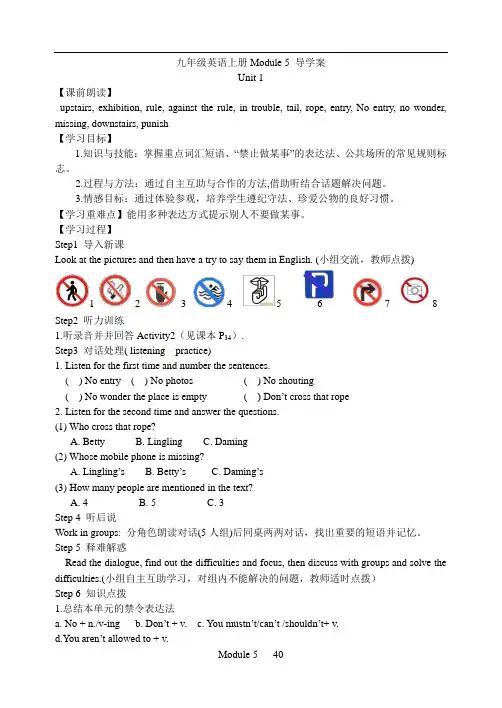
九年级英语上册Module 5 导学案Unit 1【课前朗读】upstairs, exhibition, rule, against the rule, in trouble, tail, rope, entry, No entry, no wonder, missing, downstairs, punish【学习目标】1.知识与技能:掌握重点词汇短语、“禁止做某事”的表达法、公共场所的常见规则标志。
2.过程与方法:通过自主互助与合作的方法,借助听结合话题解决问题。
3.情感目标:通过体验参观,培养学生遵纪守法、珍爱公物的良好习惯。
【学习重难点】能用多种表达方式提示别人不要做某事。
【学习过程】Step1 导入新课Look at the pictures and then have a try to say them in English. (小组交流,教师点拨)1 2 3 4 5 6 7 8 Step2 听力训练1.听录音并并回答Activity2(见课本P34).Step3 对话处理( listening practice)1. Listen for the first time and number the sentences.( ) No entry ( ) No photos ( ) No shouting( ) No wonder the place is empty ( ) Don’t cross that rope2. Listen for the second time and answer the questions.(1) Who cross that rope?A. BettyB. LinglingC. Daming(2) Whose mobile phone is missing?A. Lingling’sB. Betty’sC. Daming’s(3) How many people are mentioned in the text?A. 4B. 5C. 3Step 4 听后说Work in groups: 分角色朗读对话(5人组)后同桌两两对话,找出重要的短语并记忆。
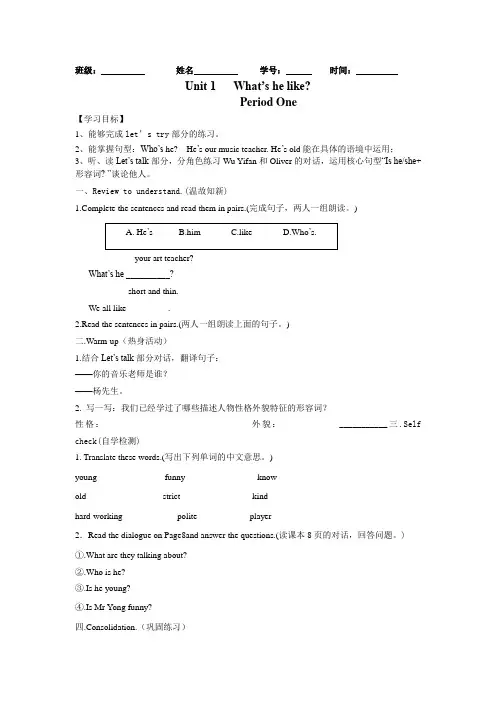
班级:姓名学号:时间:Unit 1 What’s he like?Period One【学习目标】1、能够完成let’s try部分的练习。
2、能掌握句型:Who’s he? He’s our music teacher. He’s old能在具体的语境中运用;3、听、读Let’s talk部分,分角色练习Wu Yifan和Oliver的对话,运用核心句型“Is he/she+形容词? ”谈论他人。
一、Review to understand.(温故知新)plete the sentences and read them in pairs.(完成句子,两人一组朗读。
)---- __________ your art teacher?---- What’s he __________?----_________ short and thin.---- We all like _________.2.Read the sentences in pairs.(两人一组朗读上面的句子。
)二.Warm-up(热身活动)1.结合Let’s talk部分对话,翻译句子:——你的音乐老师是谁?________________________——杨先生。
______________2. 写一写:我们已经学过了哪些描述人物性格外貌特征的形容词?性格:________________________ 外貌:________________________三.Selfcheck(自学检测)1. Translate these words.(写出下列单词的中文意思。
)young __________ funny ____________ know ___________old ____________ strict _____________ kind ______________hard-working __________ polite ___________ player ______________2.Read the dialogue on Page8and answer the questions.(读课本8页的对话,回答问题。
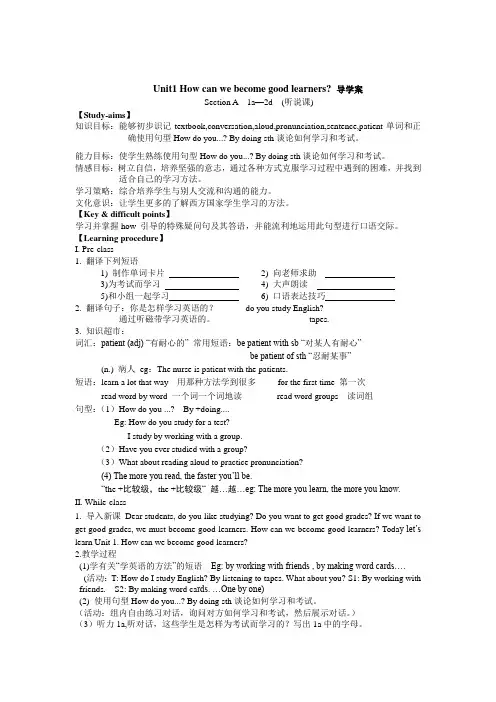
Unit1 How can we become good learners? 导学案Section A 1a—2d (听说课)【Study-aims】知识目标:能够初步识记textbook,conversation,aloud,pronunciation,sentence,patient单词和正确使用句型How do you...? By doing sth谈论如何学习和考试。
能力目标:使学生熟练使用句型How do you...? By doing sth谈论如何学习和考试。
情感目标:树立自信,培养坚强的意志,通过各种方式克服学习过程中遇到的困难,并找到适合自己的学习方法。
学习策略:综合培养学生与别人交流和沟通的能力。
文化意识:让学生更多的了解西方国家学生学习的方法。
【Key & difficult points】学习并掌握how 引导的特殊疑问句及其答语,并能流利地运用此句型进行口语交际。
【Learning procedure】I. Pre-class1. 翻译下列短语1) 制作单词卡片2) 向老师求助3)为考试而学习4) 大声朗读5)和小组一起学习6) 口语表达技巧2. 翻译句子:你是怎样学习英语的?______ do you study English?通过听磁带学习英语的。
_______ _______ ______ tapes.3. 知识超市:词汇:patient (adj) “有耐心的” 常用短语:be patient with sb “对某人有耐心”be patient of sth “忍耐某事”(n.) 病人eg:The nurse is patient with the patients.短语:learn a lot that way 用那种方法学到很多for the first time 第一次read word by word 一个词一个词地读read word groups 读词组句型:(1)How do you ...?---By +doing....Eg: How do you study for a test?I study by working with a group.(2)Have you ever studied with a group?(3)What about reading aloud to practice pronunciation?(4) The more you read, the faster you’ll be.“t he +比较级,the +比较级“ 越…越…eg: The more you learn, the more you know.II. While-class1. 导入新课Dear students, do you like studying? Do you want to get good grades? If we want to get good grades, we must become good learners. How can we become good learners? Toda y let’s learn Unit 1. How can we become good learners?2.教学过程(1)学有关“学英语的方法”的短语Eg: by working with friends , by making word cards…. (活动:T: How do I study English? By listening to tapes. What about you? S1: By working with friends. S2: By making word ca rds. …One by one)(2) 使用句型How do you...? By doing sth谈论如何学习和考试。
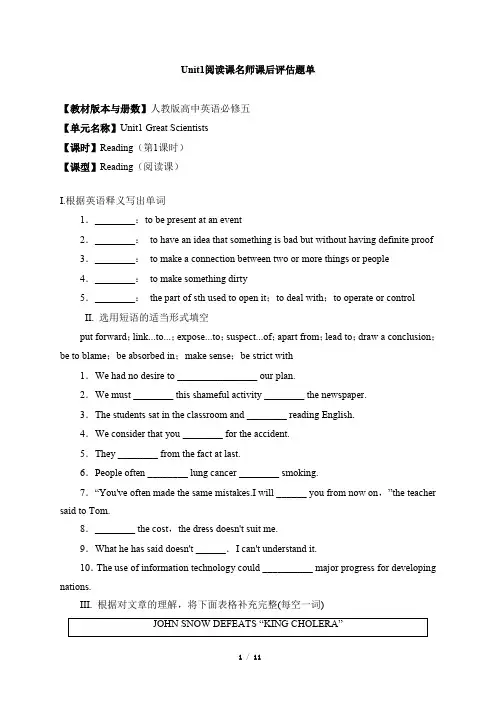
Unit1阅读课名师课后评估题单【教材版本与册数】人教版高中英语必修五【单元名称】Unit1 Great Scientists【课时】Reading(第1课时)【课型】Reading(阅读课)I.根据英语释义写出单词1.________:to be present at an event2.________:to have an idea that something is bad but without having definite proof 3.________:to make a connection between two or more things or people4.________:to make something dirty5.________:the part of sth used to open it;to deal with;to operate or controlII. 选用短语的适当形式填空put forward;link...to...;expose...to;suspect...of;apart from;lead to;draw a conclusion;be to blame;be absorbed in;make sense;be strict with1.We had no desire to ________________ our plan.2.We must ________ this shameful activity ________ the newspaper.3.The students sat in the classroom and ________ reading English.4.We consider that you ________ for the accident.5.They ________ from the fact at last.6.People often ________ lung cancer ________ smoking.7.“You've often made the same mistakes.I will ______ y ou from now on,”the teacher said to Tom.8.________ the cost,the dress doesn't suit me.9.What he has said doesn't ______.I can't understand it.10.The use of information technology could __________ major progress for developing nations.III. 根据对文章的理解,将下面表格补充完整(每空一词)___ not to expose people toIV. 根据提示复述课文John Snow ... ... ...in the 19th century. He ... ... ...in order to defeat it. In 1854 ... ... .... He marked on a map where ... ... ... and he found that ... ... ...died. So he decided ... ... .... He suggested that the source of all water supplies ... ... .... Finally, ... ... ....参考答案I. 1.attend 2.suspect 3.link 4.pollute 5.handleII. 1. put forward 2. expose to 3. were absorbed in 4. are to blame 5. drew a conclusion 6. link to 7. be strict with 8. Apart from 9. make se nse 10. lead toIII. 1.deadly 2.cure 3.absorbed 4.neighbourhoods5.severe/serious 6.blame7.polluted8.Measures/Steps9.source10.instructedIV. John Snow was a well-known doctor in London in the 19th century. He wanted to find the cause of cholera in order to defeat it. In 1854 when a cholera broke out, he began to gather information. He marked on a map where all the dead people had lived and he found that many people who had drunk the dirty water from the pump died. So he decided that the polluted water carried cholera. He suggested that the source of all water supplies be examined and the water companies were instructed not to expose people to polluted water any more. Finally, “King Cholera” was defeated.Unit1 语言知识点课名师课后评估题单【教材版本与册数】人教版高中英语必修五【单元名称】Unit1 Great Scientists【课时】Learning about language(第2课时)【课型】Learning about language(语言知识点课)I.单项填空:1. Mr. Green stood up in defence of the poor girl, saying that she was not the one ______.A. blamedB. blamingC. to blameD. to be blamed2. _______ for the breakdown of the school computer network, Jack was in low spirits.A. BlamingB. BlamedC. To blameD. To be blamed3. As nobody knows what is wrong with the machine, we must send for an engineer to ____ the problem.A. handleB. raiseC. faceD. present4. The warm sunshine ________ the coming of spring.A. declaresB. announcesC. predictsD. publishes5. _______ to the dialect of the local place, he gradually learned to speak some of it.A. ExposedB. ExposingC. ExposeD. To expose6. Alice was very _______ at the news that she would be taken to the party.A. excitingB. excitedC. excitementD. exciteII. 利用本节所学的词汇,短语或句型翻译下列句子1. 我们不应该把失败归咎于运气不佳。
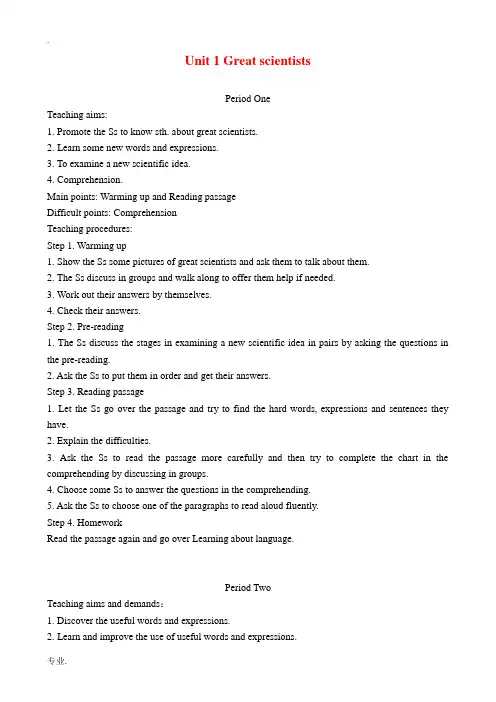
Unit 1 Great scientistsPeriod OneTeaching aims:1. Promote the Ss to know sth. about great scientists.2. Learn some new words and expressions.3. To examine a new scientific idea.4. Comprehension.Main points: Warming up and Reading passageDifficult points: ComprehensionTeaching procedures:Step 1. Warming up1. Show the Ss some pictures of great scientists and ask them to talk about them.2. The Ss discuss in groups and walk along to offer them help if needed.3. Work out their answers by themselves.4. Check their answers.Step 2. Pre-reading1. The Ss discuss the stages in examining a new scientific idea in pairs by asking the questions in the pre-reading.2. Ask the Ss to put them in order and get their answers.Step 3. Reading passage1. Let the Ss go over the passage and try to find the hard words, expressions and sentences they have.2. Explain the difficulties.3. Ask the Ss to read the passage more carefully and then try to complete the chart in the comprehending by discussing in groups.4. Choose some Ss to answer the questions in the comprehending.5. Ask the Ss to choose one of the paragraphs to read aloud fluently.Step 4. HomeworkRead the passage again and go over Learning about language.Period TwoTeaching aims and demands:1. Discover the useful words and expressions.2. Learn and improve the use of useful words and expressions.Main points: Learn to use the words and expressions that the Ss discover.Difficult points: Improve the use of the words and expressions.Teaching procedures:Step 1. Learning about language1. Discover the useful words and expressions in this unit in groups of four.2. Ask the Ss to show their results to the class.3. Ask them to study the words and expressions in Ex.1.4. Ss have a discussion and do the exercises.5. Check their answers.6. Change the verbs into nouns and make sentences by using “make a …〞Step 2. Using words and expressions1. Make sure the Ss know the words and expressions.2. Let the Ss work in groups to complete the blank in Ex.1.3. Check their answers.4. Do the translations. Ss discuss the sentences and the translate them into English, using the words and phrases in brackets.Step 3. Words learning1. Show the Ss a list of prefixes to talk about them.2. Ask them to work in groups to find some words with the prefixes and study their meanings.3. Let them show their results to the class.4. Walk around the class to give them help if needed.Step 4. Study the use and meanings of suggest1. Study the meaning of suggest by looking the dictionary entry.2. Match the meanings with the sentences on the right in Ex.4.3. Check their answers.Step 5. HomeworkTeaching aims and demands:1. Discover the useful structure.2. Learn to use the grammar of past participle.3. Enable the Ss understand the past participle using as attribute and predicative.Main points: Learn the usage of the past participle using as attribute and predicative.Difficult points: Use the useful structure.Teaching procedures:Step 1. RevisionReview the past participle of some verbs.Step 2.1. Look at the chart and study the phrases.Past participle as the attribute and the predicative(1) terrified people(2) reserved seats(3) polluted water(4) a crowded room(5) a pleased winner(6) children who look astonished(7) a vase that is broken(8) a door that is closed(9) the audience who feel tired(10) an animal that is trapped3. Ask the Ss the following questions:(1) What kind of words before the past participles?(2) What kind of words after the past participles?4. Ask the Ss find the sentences using the past participle in the reading passage.5. Ss have a discussion and complete the chart with the same meaning of the phrases above.6. Ss show their results to the class.7. Complete the sentences in Ex.3.Step 3. Using structure1. Make sure the Ss know the words and the discuss in groups to finish the sentences using past participle.(Ex.1)2. Rewrite the sentences into one sentence using the past participle as the attribute or predicative.3. Check their answers.Step 4. HomeworkWrite down 1, 3, 5, 7 of Ex.2 in the exercise book.Period FourTeaching aims and demands:1. Improve the Ss listening skills.2. Know more about great scientists.Main points: Listening and speakingDifficult points: Get to know the information of listening materials.Teaching procedures:Step 1. Listening and speaking1. Listen to the tape and answer the questions.(1) What did Qian Xuesen study first?(2) What experience did he get in America that was very useful for China?(3) What was Qian Xuesen’s achievement when he returned to China from America?(4) How has he been honoured in China?(5) How did Steve honour him?Step 2. Speaking1. Ss discuss what scientific job they will do in the future in pairs by using the questions and expressions on Page 6.2. Ask some Ss to talk in class.Step 3. Listening and talking1. Play the tape for the Ss to listen and finish the exercises in the workbook, pause from time to time if needed.2. Check their answers.3. Work in pairs. Imagine you are going to meet a specialist about a newly-found flower by using the useful sentences on Page 42.Step 4. Listening task1. Play the tape for the Ss to get the information of the listening task.2. Check their answers.Step 5. HomeworkPrepare the reading task.Period FiveTeaching aims and demands:Improve the Ss reading skills and their talent in getting the information.Main points: Reading and reading taskDifficult points: Finding the Euler path.Teaching procedures:Step 1. RevisionRevise the past participle used as the attribute and predicative.Step 2. Reading1. Ss read the passage as fast as they can and then draw the two theories of the universe in groups.2. Ask the Ss to show their pictures to the class.3. Ss read the passage again and find the problems they have.4. Solve the Ss’ problems.5. Discuss in pairs. If you were Nicolaus Copernicus, would you have hidden your theory for so many years? Why?6. Choose some Ss to share their ideas to the class.Step 3. Reading task1. Ss read the passage and answer the following questions.(1) What is odd point? (2) What is even point? (3) What rule did Euler find?2. Ss discuss in groups and try to find the answers.3. Teacher walks around to offer them help.4. Use the rule to see if you can go over the diagram, not missing any points or going over any line twice.( See figures on Page 46)5. Ss work in groups.Step 4. HomeworkWrite a short passage about Copernicus.Period SixTeaching aims and demands:1. Try to write sth persuasive.2. Learn to write a report about people.Main points:Make a plan in discussion.Difficult points:Write a passage / a report.Teaching procedures:Step 1. Writing1.Ask the Ss to read the passage again and gather some information about Copernicus.2. Plan to write a letter.Step 2. Writing taskWrite a report about your scientist, his/her life, achievements and the key to his/her success.1. Before you begin to write, remember to put your information under three headings: life, achievements and key to success.2. Plan your report like the one on P47.3. Ask them to read their plans.4. Begin to write the report.Step 3. HomeworkComplete the report and write down on the exercise book.。
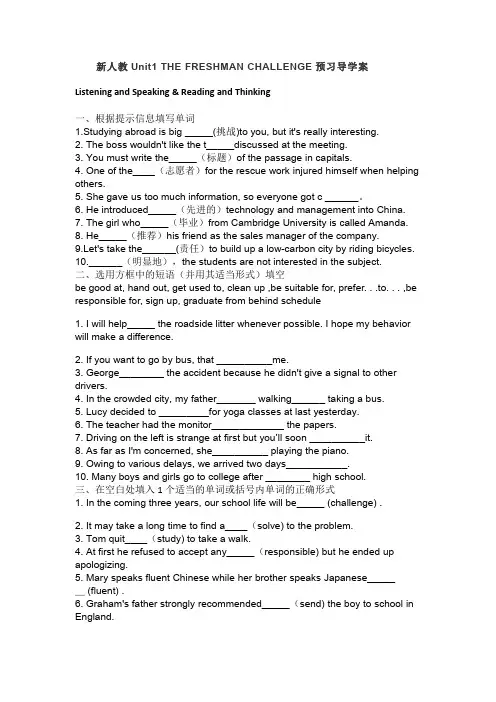
新人教Unit1THE FRESHMAN CHALLENGE预习导学案Listening and Speaking&Reading and Thinking一、根据提示信息填写单词1.Studying abroad is big_____(挑战)to you,but it's really interesting.2.The boss wouldn't like the t_____discussed at the meeting.3.You must write the_____(标题)of the passage in capitals.4.One of the____(志愿者)for the rescue work injured himself when helping others.5.She gave us too much information,so everyone got c______。
6.He introduced_____(先进的)technology and management into China.7.The girl who_____(毕业)from Cambridge University is called Amanda.8.He_____(推荐)his friend as the sales manager of the company.9.Let's take the______(责任)to build up a low-carbon city by riding bicycles.10.______(明显地),the students are not interested in the subject.二、选用方框中的短语(并用其适当形式)填空be good at,hand out,get used to,clean up,be suitable for,prefer...to...,be responsible for,sign up,graduate from behind schedule1.I will help_____the roadside litter whenever possible.I hope my behavior will make a difference.2.If you want to go by bus,that__________me.3.George________the accident because he didn't give a signal to other drivers.4.In the crowded city,my father_______walking______taking a bus.5.Lucy decided to_________for yoga classes at last yesterday.6.The teacher had the monitor_____________the papers.7.Driving on the left is strange at first but you’ll soon__________it.8.As far as I'm concerned,she__________playing the piano.9.Owing to various delays,we arrived two days___________.10.Many boys and girls go to college after________high school.三、在空白处填入1个适当的单词或括号内单词的正确形式1.In the coming three years,our school life will be_____(challenge).2.It may take a long time to find a____(solve)to the problem.3.Tom quit____(study)to take a walk.4.At first he refused to accept any_____(responsible)but he ended up apologizing.5.Mary speaks fluent Chinese while her brother speaks Japanese______(fluent).6.Graham's father strongly recommended_____(send)the boy to school in England.7.______(obvious),she is very clever because she can work out such a difficult problem.8.Having shown you around our school,we will introduce our most_____(advance)science lab to you.9.What the teacher said was so_____(confuse)that the students could hardly understand it.10._(actual),Mr.Black is an honest and reliable person,whom you can depend on.四、根据汉语提示完成句子1.Our teacher_____________________________The Wandering Earth.我们的老师推荐我们看《流浪地球》这部电影。
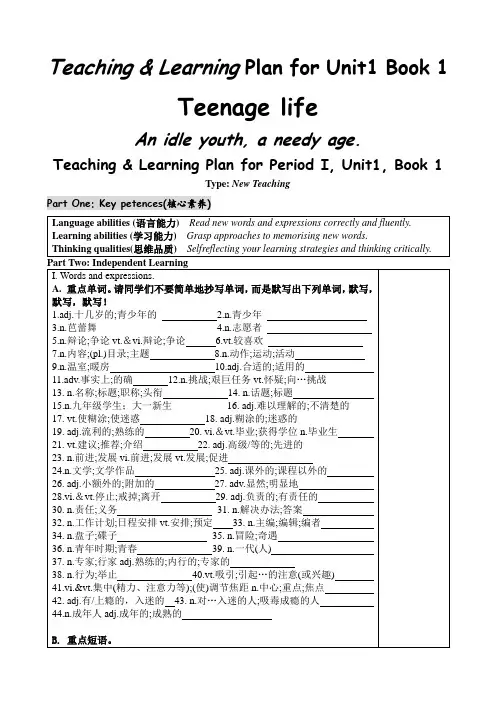
Teaching & Learning Plan for Unit1 Book 1Teenage lifeAn idle youth, a needy age. Teaching & Learning Plan for Period I, Unit1, Book 1Type: New TeachingPart One: Key petences(核心素养)1.喜欢……多于……2.对……适合的……3.打扫(或清除)干净4.对……负责5.报名(参加课程)6.集中,特别关注7.喜爱 8.对……很入迷C. 熟词生意。
1. content[kən'tent] adj. 满足的;满意的be content with sth对……心满意足She is not content with these explanations.be content to do sth满足于做某事;甘愿做某事A few were content to pay the fines.2.title vt. 加标题于;赋予头衔;把……称为The single is titled “white love”. 这首单曲名为《白色爱情》Part Three: Cooperative Study. 词形变化1.prefer v.→n.______________(喜欢)2.challenge v.→adj.____________(具有挑战性的)3. confuse v.→adj._________(糊涂的;迷惑的)→adj. ______________(难以理解的;不清楚的)4. graduate v.→n._____(毕业;毕业典礼)5. remend v.→n.________(推荐;提议;推荐信)6. advance v.→adj._____(高级的;高等的;先进的)7.obvious adj.→adv._____(显然;明显地)8. responsible adj.→n._________(责任;义务)9.solution n.→v.____(解决;处理)10. adventure n.→adj. ______(有冒险精神的;有新意的)11. survival adj.→v._________(幸存)12. behaviour n.→v._______(表现;表现得体;有礼貌)13. attract v.→n.____________(吸引力;爱慕;吸引)→adj.___________(吸引人的;令人愉快的)14. fluent adj.→n.______(流利,流畅)15. addicted adj.→n._______(对...入迷的人;吸毒成瘾的人)→n.___________ (迷;入迷;嗜好) Part Four: Knowledgeintegrating & Frameworkbuilding词缀: ly (副词后缀,加在形容词后,使其变成副词)词汇拓展①obviously adv.明显地He was obviously drunk. 他显然是醉了。
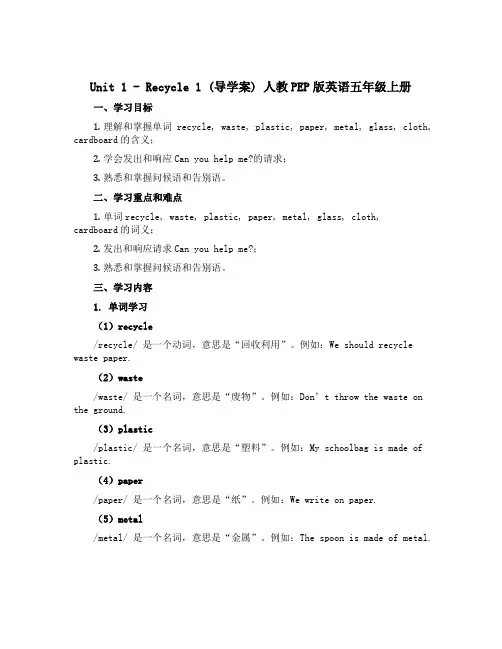
Unit 1 - Recycle 1 (导学案) 人教PEP版英语五年级上册一、学习目标1.理解和掌握单词recycle, waste, plastic, paper, metal, glass, cloth, cardboard的含义;2.学会发出和响应Can you help me?的请求;3.熟悉和掌握问候语和告别语。
二、学习重点和难点1.单词recycle, waste, plastic, paper, metal, glass, cloth,cardboard的词义;2.发出和响应请求Can you help me?;3.熟悉和掌握问候语和告别语。
三、学习内容1. 单词学习(1)recycle/recycle/ 是一个动词,意思是“回收利用”。
例如:We should recycle waste paper.(2)waste/waste/ 是一个名词,意思是“废物”。
例如:Don’t throw the waste on the ground.(3)plastic/plastic/ 是一个名词,意思是“塑料”。
例如:My schoolbag is made of plastic.(4)paper/paper/ 是一个名词,意思是“纸”。
例如:We write on paper.(5)metal/metal/ 是一个名词,意思是“金属”。
例如:The spoon is made of metal.(6)glass/glass/ 是一个名词,意思是“玻璃”。
例如:Be careful! The glass is easily broken.(7)cloth/cloth/ 是一个名词,意思是“布料”。
例如:My mom can make a dress with cloth.(8)cardboard/cardboard/ 是一个名词,意思是“纸板”。
例如:The box is made of cardboard.2. 情景对话(1)A: Can you help me?B: Yes, of course. A: Can you help me pick up the waste paper? B: Ok, let’s go.(2)A: Hello!B: Hello! A: How are you? B: I’m fine, thank you. And you? A: I’m good, too. Bye! B: Bye!四、学习要求1.记忆和理解新学单词的词义;2.理解和熟悉常用的问候语和告别语;3.通过配对、填空、朗读等多种形式来加深对所学内容的理解和记忆。
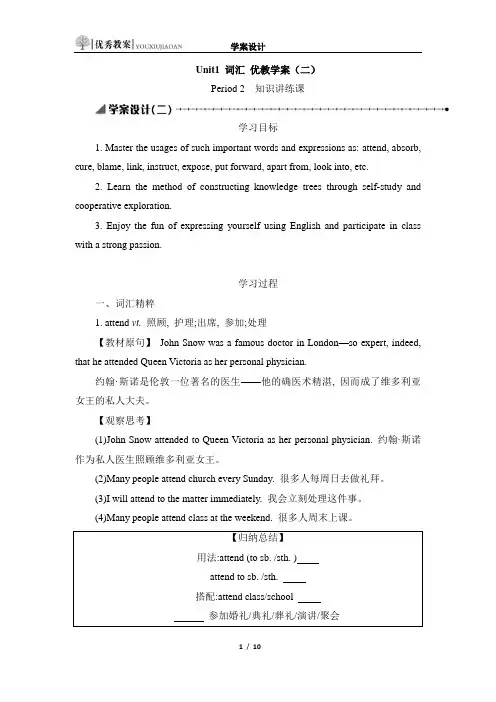
Unit1 词汇优教学案(二)Period 2知识讲练课学习目标1. Master the usages of such important words and expressions as: attend, absorb, cure, blame, link, instruct, expose, put forward, apart from, look into, etc.2. Learn the method of constructing knowledge trees through self-study and cooperative exploration.3. Enjoy the fun of expressing yourself using English and participate in class with a strong passion.学习过程一、词汇精粹1. attend vt. 照顾, 护理;出席, 参加;处理【教材原句】John Snow was a famous doctor in London—so expert, indeed, that he attended Queen Victoria as her personal physician.约翰·斯诺是伦敦一位著名的医生——他的确医术精湛, 因而成了维多利亚女王的私人大夫。
【观察思考】(1)John Snow attended to Queen Victoria as her personal physician. 约翰·斯诺作为私人医生照顾维多利亚女王。
(2)Many people attend church every Sunday. 很多人每周日去做礼拜。
(3)I will attend to the matter immediately. 我会立刻处理这件事。
(4)Many people attend class at the weekend. 很多人周末上课。
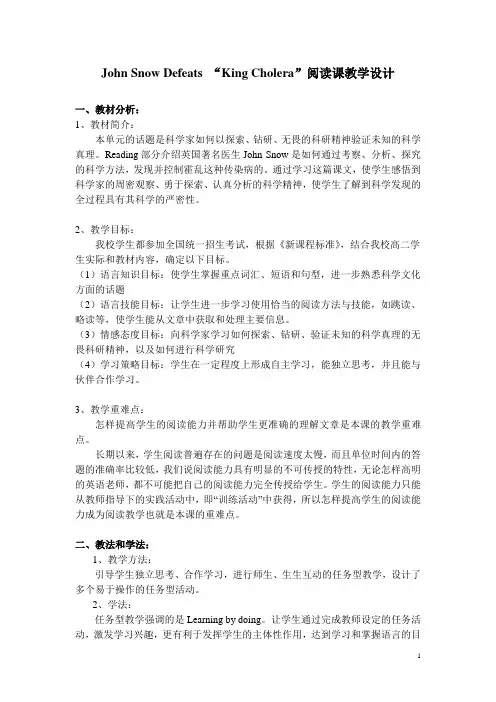
John Snow Defeats “King Cholera”阅读课教学设计一、教材分析:1、教材简介:本单元的话题是科学家如何以探索、钻研、无畏的科研精神验证未知的科学真理。
Reading部分介绍英国著名医生John Snow是如何通过考察、分析、探究的科学方法,发现并控制霍乱这种传染病的。
通过学习这篇课文,使学生感悟到科学家的周密观察、勇于探索、认真分析的科学精神,使学生了解到科学发现的全过程具有其科学的严密性。
2、教学目标:我校学生都参加全国统一招生考试,根据《新课程标准》,结合我校高二学生实际和教材内容,确定以下目标。
(1)语言知识目标:使学生掌握重点词汇、短语和句型,进一步熟悉科学文化方面的话题(2)语言技能目标:让学生进一步学习使用恰当的阅读方法与技能,如跳读、略读等,使学生能从文章中获取和处理主要信息。
(3)情感态度目标:向科学家学习如何探索、钻研、验证未知的科学真理的无畏科研精神,以及如何进行科学研究(4)学习策略目标:学生在一定程度上形成自主学习,能独立思考,并且能与伙伴合作学习。
3、教学重难点:怎样提高学生的阅读能力并帮助学生更准确的理解文章是本课的教学重难点。
长期以来,学生阅读普遍存在的问题是阅读速度太慢,而且单位时间内的答题的准确率比较低,我们说阅读能力具有明显的不可传授的特性,无论怎样高明的英语老师,都不可能把自己的阅读能力完全传授给学生。
学生的阅读能力只能从教师指导下的实践活动中,即“训练活动”中获得,所以怎样提高学生的阅读能力成为阅读教学也就是本课的重难点。
二、教法和学法:1、教学方法:引导学生独立思考、合作学习,进行师生、生生互动的任务型教学,设计了多个易于操作的任务型活动。
2、学法:任务型教学强调的是Learning by doing。
让学生通过完成教师设定的任务活动,激发学习兴趣,更有利于发挥学生的主体性作用,达到学习和掌握语言的目的。
3、教具:使用多媒体平台、导学案、教材,以扩大学生知识面和求知欲。
Module 5Shopping主题范畴:人与自我子主题:合理消费1. 语言知识:掌握相关词汇、句子,并能进行关于购物的对话。
2. 文化知识:了解网购的优缺点,学会理性购物。
通过为母亲选礼物,学会以感恩的心关爱父母和他人。
3. 语言技能:掌握特殊疑问句的各种用法。
4. 学习策略:能使用特殊疑问句进行有关购物的对话交流,并读懂关于购物的文章。
Unit 1What can I do for you?基础练习请预习下列重点单词和短语,并完成下面的表格及相关训练(标•的为重点单词拓展内容)。
学以致用根据语境或提示,完成填空。
1. The bird looks (look) very beautiful.2. I usually buy some vegetables at the big m arket .3. This kind of biscuit (饼干) tastes nice. I want some more.4. —What s ize bowl of noodles would you like?—I'd like medium, please.5. The p rice of the puter is 5,000 yuan. I can't afford it.6. The grapes are very fresh (新鲜的) and they also taste good.7. All these books are on s ale today and tomorrow.8. There is a supermarket (超市) next to my home, so it's convenient(方便的) to buy things.9. I went to a farm to pick some strawberries (strawberry) last weekend. It was really fun.佳句仿写用句中黑体词或短语仿写句子。
Book 5 Unit1 Great scientist1.知识与技能:1)Unable the students to talk about the qualities needed to bea great scientist .2) Enable the students to master some useful expressions about great scientist.2.过程与方法:Fasting reading, task- based method and discussion.3.情感态度与价值观:Help the students to know the qualities needed to be a great scientist .4.重点: Teach the basic reading skills :skimming and scanning5.难点:How to create a good situation to communicate with others about a great scientist.Step 1:RevisionIn the last period, we learned about John Snow who defeats “King Cholera”. Now please say something about this famous person who has made great contributions to the world,using the complete sentences.Step 2: Grammar CompletionRead the following passage about Qian Xuesen to get some information about this great scientist. While reading, please complete the passage.Step 3: Reading Aloud (5 minutes)Read the following passage, paying attention to the pronunciation and intonation. Make some marks to help you read better. For the first time, read after the teacher, then pratise by yourself. After that, I will ask someone to read in class.Step 4: Pre-listening:Prediction and Question-Asking (5 minutes)教师活动:Now we are going to listen to some material about Qian Xuesen. Can you predict the content of the listening, based on the pictures and the exercises in the textbook. If you talk with your friends about Qian Xuesen, what topics would you like to cover? ……T: You may raise the questions according to the hints below: 学生活动; 学生两人一组根据图片,练习的内容推测将要听得内容,用英语提出三个问题1. 他是什么时候出生和逝世的?_________________________________2. 他为国家做出了哪些贡献,取得的哪些荣誉?___________________3. 他被成为是中国的航天之父,是吗?___________________________Step 5:While-listening: Listening for Detailed Information (5 minutes)Now let’s listen to a conversation between Yu Ping and Steve Smith about Qian Xuesen’s life. Please listen carefully and write down as much information as possible.Step 6.1. Listen to Parts 1 and 2 of the tape for the first time an writedown the main idea. Then fill the following chart.2 Now listen to Part 1 again and answer these questions. 1) What did Qian Xuesen study first?2) What experience did he get in America that was useful for China?3)What was Qian Xuesen’s main achievement when he returned to China?Step 6:Reading and writing COPERNICUS’ REVOLUTIONARY THEORYBrief introductionT:We know the first scientist is Copernicus. He was one of the first scientists to use mathematical observations to collect information. He believed the sun is the center of the universe and the earth and other planets went around it.学生活动:通过老师展示的关于哥白尼的相关信息,学生做出判断,并且回答几个问题。
Unit 1 GREAT SCIENTISTSJOHN SNOW DEFEATS“KING CHOLERA”John Snow was a famous doctor in London — so expert, indeed, that he attended Queen Victoria as her personal physician. But he became inspired when he thought about helping ordinary people (who were) exposed to cholera. This was the deadly disease of itsday. Neither its cause nor its cure was understood. So many thousands of terrified people diedevery time there was an outbreak. John Snow wanted to face the challenge and solve this problem. He knew that cholera would never be controlled until its cause was found.(expose:1暴露be exposed to all kinds of weather.经受风吹雨打。
Expose sb to danger 使某人面临危险。
A student who has been exposed to English for some 6 years.接触英语达六年左右的学生。
2.揭露。
Expose a politician’s lies. He has been exposed as a liar.他说谎的行为被揭穿。
)He became interested in two theories(that possibly explained how cholera killed people). The firstsuggested that cholera multiplied in the air, a cloud of dangerous gas floated arounduntil it found its victims. From the stomach the disease quickly attacked the body and soon the affected person died.John Snow suspected that the second theory was correct but he needed evidence. So when another outbreak hit London (There was another outbreak)in 1854, he was ready to begin his enquiry. As the disease spread quickly through poor neighbourhoods, he began to gather information. In two particular streets, the cholera outbreak was so severe that more than 500 people died in ten days. He was determined to find out why.First he marked on a map the exact places(where all the dead people have lived). This gave him a valuable clue about the cause of the disease. Many of the deaths were near the water pump in Broad Street (especially numbers 163738 and 40). He also noticed that some houses (such as 20 and 21 Broad Street and 8 and 9 Cambridge Street) had hadno deaths. He had not foreseen this, so he madefurther investigations. He discovered that these people worked in the pub at 7 Cambridge Street. They had been given free beer and so had not drunk the water from the pump. It seemed that the water was to blame,Next, John Snow looked into the source of the water for these two streets. He found that it came from the river(polluted by the dirty water from London). He immediately told the astonished people in Broad Street to remove the handle from the pump so that it could not be used. Soon afterwards the disease slowed down. He had shown that cholera was spread by germs and not in a cloud of gas.In another part of London, he found supporting evidence from two other deaths(that were linked to the Broad Street outbreak.)A woman,(who had moved away from Broad Street,)liked the water from the pump so much that she had it delivered to her house every day. Both she and her daughter died of cholera after drinking the water.With this extra evidence John Snow was able to announce with certainty that polluted water carried the virus.To prevent this from happening again, John Snow suggested that the source of all the water supplies be examined. The water companies were instructed not to expose people to polluted waterany more. Finally “King Cholera”was defeated.COPERNICUS’REVOLUTIONAYTHEORY Nicolaus Copernicus was frightened and his mind was confused. Although he had tried to ignore them, all his mathematical calculations led to the same conclusion: that the earth was not the centre of thesolar system. Only (if you put the sun there) did the movements of the other planets in the sky make sense. Yet he could not tell anyone about his theory as the powerful Christian Church would have punished him for even suggesting such an idea. They believed God had made the world and for that reason the earth wasspecial and must be the centre of the solar system. (Only: we can succeed only in this way. →Only( in this way) can we succeed.)The problem arose because astronomers had noticed that some planets in the sky seemed to stop, move backward and then go forward in a loop. Others appeared brighter attimes and less bright at others. This was very strange if the earth was the centre of the solar system and all planets went around it. Copernicus had thought long and hard about these problems and tried to find an answer. He had collected observations of the stars and used all his mathematical knowledge to explain them. But only new theory could do that. So between 1510 and 1514 heworked on it, gradually improving his theory until he felt it was complete.In 1514 he showed it privately to his friends. The changes (he made to the old theory) were revolutionary. He placed a fixed sun at the centre of the solar system with the planets going round it and only the moon still going around the earth. He alsosuggested that the earth was spinningas it went around the sun and this explained changes in the movement of the planets and in the brightness of the stars. His friends were enthusiastic and encouraged him to publish his ideas, but Copernicus was cautious. He did not want to be attacked by the Christian Church, so he only published it as helay dying in 1543. (with﹢宾语﹢1)doing2)/done/3)介词短语/4)形容词5)副词6)to do:He slept with the window open (with the light on).The teacher came with a book in his hand (under his arm).With a lot of homeworkto do, I had to stay at home last weekend.With the crowds cheering, the royal party drove into the palace.With signal given, the train left the station.) Certainly he was right to be careful. The Christian Church rejected his theory, saying it was against God’s idea and people (whosupported it) would be attacked. Yet Copernicus’ theory is now the basis (on which all our ideas of the universe are built.) His theory replaced the Christian idea of gravity, (which said things fell to earth because God created the earth as the centre of the universe.) Copernicus showed this was obviously wrong. Now people can see that there is a direct link between his theory and the work ofIsaac Newton, Albert Einstein and Stephen Hawking.(辨析reject,refuse,turn down, decline.Reject:断然拒绝。
Unit1 Module 5 Great Scientists本单元教学内容分析:本单元主要话题是“科学家如何以探索、钻研、无畏的科研精神验证未知的科学原理。
”通过本单元的学习,了解科学家们对人类所做出的贡献及其成果。
本单元所涉及的要点是:(1)了解著名医生John Snow、钱学森、哥白尼等科学家以及他们的作为和故事。
(2)学习表示意愿、希望和建议的句型。
(3)学习过去分词作定语和表语的结构。
(4)学习写好“persuasive writing”,以训练学生的逻辑思维及写作能力.学情分析:课时分配:8课时T he 1st Period warming up and pre-readingThe 2ndand 3rd Periods ReadingThe 4th and 5th Periods GrammarThe 6th Period Reading and writingThe 7th and 8th periods Main RevisionThe 1st Periodwarming up and pre-readingTeaching Aims:1. Learn some new words and expressions.2. Know some great scientists and their achievements.3. Knowsome important qualities a scientist should have and the stages in examininga new scientific idea.Difficult and Important Points:1.Word study2.Discuss in groups the stages in examining a new scientific idea.Teaching Methods:1.Inductive method2.Pair work & group work3.Word Study according to the situations given (Do exercises)Teaching Procedures:Step1. Warming-up1. There are some great scientific achievements that have changed the world. Can you name some of them? What kind of role do they play in the field of science? Do these achievements have anything in common? Match the inventions with their inventors below before you answer all these questions.Alexander Bell electricityThomas Edison the First telephoneLaity Brothers the electric LampMadame Curie black holes in UniverseFranklin Theory of GravitySteven Hawking the First PlaneElbert Einstein RadiumIsaac Newton the Theory of Relativity2. Who found the cure for SARS? (钟南山)Why is SARS so horrible?What kind of disease is SARS?----infectious disease3. Can you name any other infectious disease? ----SARS, AIDS, bird flu(2005), choleraH1N1,HFMD(手足口病)Step2. Pre-reading1. Cholera may be rare nowadays except in some poor areas, but back in the 1830s-1840s, it was probably No.1 killer in the world. There were four outbreaks of cholera in the 1830s and 1840s, which killed many thousands of people in the industrial cities of England. In 1854 on August 31st “the most terrible outbreak of cholera which ever occurred in the kingdom” began. It was so violent and sudden that 127 people around Broad Street died in the first three days. And then a famous physician John Snow discovered the source of the disease and since then Cholera was finally brought under control.2. How did he solve the problem of cholera? Actually, he followed a scientific procedure to carry out his scientific research. The whole procedure is made up of 7 steps. Can you put them in a right order?Draw a conclusion Think of a method Collect results Make up a question Find a problem Analyze the results Repeat if necessaryStep 3 SummaryStep 4 Homework Assignment1.Read the passage John Snow Defeats “King Cholera”.2. Learn the new words by heart and prepare for tomorrow’s dictation.课后反思:The 2ndand 3rd Periods ReadingTeaching aims:1. Learn some new words and expressions.2. Improve the students’ reading skills.3. Know how to prove a new idea in scientific research.Difficult and Important Points:(1)Reading comprehension(2)What did John Snow do to prove a new idea in scientific research?Teaching Methods:1. Group work2. Competition3. Illustration4. Deductive MethodTeaching Procedures:Step 1Lead inBackground introduction to John SnowJohn Snow (1813-1858) was born and worked as a doctor in Great Britain. He was originally an anesthetist(麻醉师).He was so famous that he became the doctor for Queen Victoria at the births of her many children.Four outbreaks of cholera in the 1830s and 1840s killed many people in England. In 1854, “the most terrible outbreak of cholera which ever occurred in the kingdom” began. It was so violent and sudden that 127people died in the first three days. Step 2 Skimming and ScanningMore questions are given to get the general ideas of this passage and some obvious facts.Who defeats “King Cholera“? John SnowWhat happened in 1854? Cholera outbreak hit London.How many people died in 10 days? 500Why is there no death at No. 20 and 21 Broad Street as well as at No. 8 and 9 Cambridge Street?These families had not drunk the water from the Broad Street pump.Step 3 Reading for details1. Why couldn’t the cholera be under control at first?Neither its cause, not its cure was understood.2. Which theory did John Snow believe in?People absorbed cholera into their bodies with their meals.3. John Snow finally proved the theory he believed by ________.gathering information with the help of a maplooking into the source of the water for Broad Street and Cambridge Street Separating those who suffered cholera from those who didn’tBoth A and B (right choice)4. To prevent the cholera from spreading again, what did John Snow do? Suggested that the source of all water supplies be examine. Suggested that new methods of dealing with polluted water be found. Instructed the water companies not to expose people to the polluted water anymore.Step 4 Summing up: Read the passage silently and quickly and match the stages ofThe same with above:Find a problem draw a conclusion Think of a method Collect results Make up a question Analyze the results Repeat if necessaryParagraph 1: Introduction of John Snow and CholeraParagraph 2: Two theoryParagraph 3-5: Study of the breakout in 1854Paragraph 3: Think of a method: Test two theoryCollect the result: Mark the deathAnalyze the result: Reason for death and no deathParagraph 4: Analyze the result: Find the resource of the waterParagraph 5: Repeat if necessary: Find more evidence.Draw a conclusion: Cholera was spread by germPolluted water carried cholera Paragraph 6: Prevention of CholeraStep 5 Retell the passage (文章缩写仅供参考)Provide ss with a summary with some blanks. Let them retell the passage as well as pay attention to some important words.Read the passage again and fill in the blanks:John Snow was a well-known ____ in London in the ___ century. He wanted to find the ______ of cholera in order to ______ it. In 1854 when a cholera ____ out, he began to gather information. He _____ on a map where all the dead people had lived and he found that many people who had drunk the dirty water from the ______ died. Sohe decided that the polluted water carried cholera. He suggested that the _____ of all water supply be _______ and new methods of ________ with polluted water be found. Finally, “King Cholera” was defeated.Key: (见课文和教师用书)Step 6Language learning1.So many thousands of terrified people died every time there was an outbreak. 每当(疾病)突发时,总有成千的人死去【句型剖析】 1)本句是一个复合句,every time引导的是一个时间状语从句,意思是“每当……”,相当于“when”。
必修5 Unit 1 Great scientists 导学案教学目标:能力目标(Ability aim)1.To activate the students’ knowledge about great scientists in the world and their achievements.2 .To get the students understand the spirit of science.3.To enable students to communicate with each other and improve students’ language expression ability.语言目标(Language aim)1. Important words: engine, characteristic, radium, enthusiastic, cautious, spin, instruct, attend, cure, severe, reject.2.Important sentences:be absorbed in, expose to ,face the challenge ,gather information ,be determined to ,the cause of ,look into ,slow down ,supporting evidence ,die of ,draw a conclusion , In addition, link to , absorb into , to blame, handle from, lead to, make sense,自主学习一 Review the following words and phrases(翻译)1 try this quiz____________ 9 mark____________________2 discover________________ 10 attack___________________3 lift up_________________ 11 evidence_______________4 invent__________________ 12 hit________________5 instrument____________ 13 be determined to____________6 become inspired_________________ 14 source___________________7 terrify_________________ 15 deliver__________________8 multiply_______________ 16 prevent … from…_______二Important words(重点词汇)1.______________vt.&vi. 结束;推断出→________________n.2.______________vt.&n. 打败,战胜;失败→______________(同义词)3.______________vt. 照顾,护理;出席,参加4.______________vt. 暴露;揭露5.______________vt.&n. 向----挑战6.______________vt.&n. 治愈,治疗;痊愈7.______________vt. 吸收;吸引;使专心8.______________adj. 致命的;完全的;充满仇恨的;如死一样的9.______________ vt. 怀疑→__________adj 怀疑的-→___________n.嫌疑犯10_____________vt. 污染,弄脏→____________n.﹝u﹞污染11_____________vt.&n. 责备,谴责12_____________vt. 宣布;通告→_______________n. 宣布13_____________vt.&vi. 捐献,捐助;贡献→_______________n.捐献,贡献14_____________vt. 命令;指示;教导→____________n.命令;指示→__________n. 指南;使用说明15__________n.&vt. 把手;处理三Important phrases(重点短语)1.提出_______________ 8.be absorbed in_____________2得出结论__________________ 9.be to blame _______________ 3分析结果______________________ 10.link...to_________________ 4找支持性证据____________ 11.set out _________________ 5照料;对付____________________6使显露;暴露 ______________7治愈某人的…,改掉某人的…__________________合作探究四. Warming Up 、Pre-reading&Reading1. Do you know some great scientists? Finish the quiz in Warming UP(请自己完成热身部分的10个问题)2.Do you know how to prove a new idea in scientific research?Setting out a new scientific idea needs many stages.Here are some stages in an experiment,please put them in a reasonable order.(得出一个新的科学观点需要过程,下面是在实验中所需的几个过程,请合理排列它们的顺序。
)a. Draw a conclusion .b. Think of a method .c. Collect resultsd. Make a questione. Find a problemf. Analyse the resultsg. Finding supporting evidenceThe order:1____ 2____ 3____ 4_____ 5____ 6_____ 7_____3. Skimming(快束浏览课文完成下列问题)1) What’s the main idea of the passage?()A. John Snow was a well-known doctor in London.B. The cause of cholera was the polluted water.C. The source of all drinking water should be examined.D. How John Snow collected ,analyzed the data and found the causeof the disease and solved it.2) true or false questions.()1.As a doctor, being able to attend Queen Victoria was an honourable thing at that time.()2.Although cholera couldn’t be cured, its cause was known to people in the days of John Snow.()3. John Snow doubted the two theories explaining how cholera killed people, so he did investigation to test them.()4.The results wouldn’t have been so clear without the map John Snow had drawn.()5.The polluted dirty water from the river was to blame for the disease.3) Finish the first exercise in Comprehending on Page 3.4. Scanning(快速阅读课文回答下列问题)1)When did John Snow become inspired though he was a famous doctor? ________________________________________________________________ 2) Why thousands of terrified people died when cholera came suddenly? ________________________________________________________________ 3) What was the second theory?________________________________________________________________ 4) Why did John Snow use the map in his research?________________________________________________________________ 5) Why did such houses as 20 and 21 Broad Street 、8 and 9 CambridgeStreet have no deaths?___________________________________________ ________________________________________________________________6) Where did the source of water for these streets come from?________________________________________________________________ 7) What conclusion did John Snow draw?_______________________________________________________________ 5. Match the inventions with their inventors below before you answer all these questions.Alexander Bell electricityThomas Edison the First telephoneLaite Brothers the electric LampMadame Curie black holes in UniverseFranklin Theory of GravitySteven Hawking the First PlaneElbert Einstein RadiumIsaac Newton the Theory of Relativity6. Careful readingRead the text carefully and choose the best answers.()1. What’s the purpose of the text?A. To show us how difficult it was to find a cure for cholera.B. To tell us how John Snow found the cause of cholera and the cure for it.C. To show us how difficult it was to carry out experiments at that time.D. To tell us the way cholera spread and how serious it was.()2. Which of the following is TRUE according to the text?A. John Snow became famous after cholera hit England in the 19th century.B. John Snow began to collect information long before cholera hit England in the 19th century.C. The mother and her daughter mentioned in the text both lived in Broad Street.D. John Snow felt unsure about the cause of cholera after he finished the map.()3. Why was cholera called “King Cholera” in the text?A. Because cholera caused many deaths.B. Because it got its name from Queen Victoria.C. Because cholera was the most deadly disease of its day.D. Because it was defeated with the help of the king.7.Read the passage again and fill in the blanks:John Snow was a well-known ________ in London in the _______ century. He wanted to find the _________ of cholera in order to __________ it. In 1854 when a cholera ________ out, he began to gather information. He _________ on a map where all the dead people had lived and he found that many people who had drunk the dirty water from the __________ died. So he decided that the polluted water carried cholera. He suggested that the _________ of all water supply be ___________ and new methods of ___________ with polluted water be found. Finally, “King Cholera” was defeated.展示提升五.重点词汇1. conclude vi.终结;结束; 推断;决定[典例]1)The meeting concluded at ten o'clock. 会议于十点钟结束。